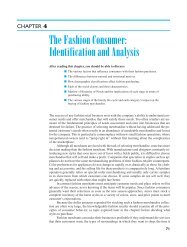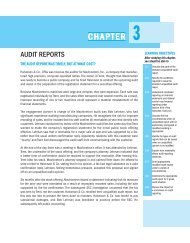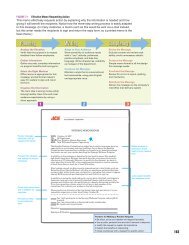Organizational Justice, Ethics, and Corporate Social Responsibility
Organizational Justice, Ethics, and Corporate Social Responsibility
Organizational Justice, Ethics, and Corporate Social Responsibility
You also want an ePaper? Increase the reach of your titles
YUMPU automatically turns print PDFs into web optimized ePapers that Google loves.
CHAPTER 2 • ORGANIZATIONAL JUSTICE, ETHICS, AND CORPORATE SOCIAL RESPONSIBILITY 65<br />
FIGURE 2.14<br />
Closing the Gap on<br />
Sweatshops<br />
People who work in sweatshops,<br />
often children, are subjected to<br />
long hours of labor for extremely<br />
low wages in oppressive <strong>and</strong><br />
dangerous conditions. Cracking<br />
down on such violations of core<br />
human values, the Gap employs<br />
over 90 full-time employees who<br />
inspect thous<strong>and</strong>s of clothing<br />
manufacturing factories worldwide<br />
to ensure that working conditions<br />
are safe <strong>and</strong> humane. As one of the<br />
approved facilities, the Qualytel de<br />
Puebla plant in Puebla, Mexico,<br />
produces garments for the Gap <strong>and</strong><br />
other concerned companies as well.<br />
makes sense. There, jobs are difficult to find, <strong>and</strong> some of the most successful companies<br />
offer as a perk to their employees the opportunity to hire their children once they graduate<br />
from school. This eases unemployment, thereby strengthening the economy. Additionally,<br />
Indians believe that keeping the family together is more important than pursuing economic<br />
opportunities. For these reasons, the practice of hiring relatives may be considered ethical—but<br />
only in India, where conditions are unique. That’s our point: Different contexts may require<br />
different ethical guidelines.<br />
If, upon reading this, you realize the complexities of attempting to behave ethically in<br />
international settings, you have reached the same conclusion as many a seasoned businessperson.<br />
As one business expert put it, “Managers living <strong>and</strong> working abroad who are<br />
not prepared to grapple with moral ambiguity <strong>and</strong> tension should pack their bags <strong>and</strong><br />
come home.” 56<br />
Why Do Some People Behave Unethically—At Least,<br />
Sometimes?<br />
Management experts long have considered the matter of why some people, at least, behave<br />
unethically on at least some occasions. Put differently, is it a matter of good people who<br />
are led to behave unethically because of external forces acting on them (i.e., “good apples<br />
in bad barrels”) or is it that bad people behave inappropriately in whatever settings they are<br />
in (i.e., “bad apples in good barrels”)? Acknowledging the key role of leaders in determining<br />
the ethical climate of an organization, some scientists have considered the possibility<br />
that because of their profound influence, some unethical leaders (so-called “bad apples”)<br />
have made their companies unethical as well (turning “good barrels into bad”), or poisoning<br />
the whole barrel, so to speak. 57 Although the relative importance of “apples” <strong>and</strong> “barrels”<br />
has yet to be firmly decided, it is clear that ethical <strong>and</strong> unethical behavior is determined<br />
by both of these classes of factors—that is, individual factors (the person), <strong>and</strong><br />
situational factors (the external forces people confront in the workplace). In this section of<br />
the chapter, we consider both sets of factors.<br />
Individual Differences in Cognitive Moral Development<br />
As you know from experience, people appear to differ with respect to their adherence to<br />
moral considerations. Some individuals, for example, refrain from padding their expense<br />
accounts even if they believe they will not get caught, solely because they believe that

















